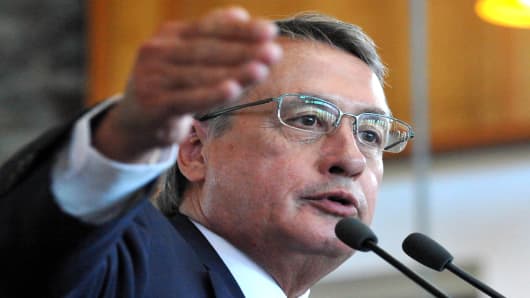Australian Treasurer Wayne Swan dismissed talk of a 'currency war' in an interview with CNBC on Saturday, but admitted that a strong Australian dollar is a concern for an economy that is heavily reliant on mining exports.
"It is a substantial headwind for the Australian economy, some of our industrial sectors in particular, our exporters, our tourism sector and even our miners," Swan said on the sidelines of the Group of 20 Nations (G-20) meeting of financial ministers and central bankers in Moscow.
The Aussie dollar has strengthened about 6 percent against the U.S.dollar since July last year. It's currently trading at about A$1.0355 to the greenback.
Swan brushed aside recent concerns about a peak in investment in Australia's mining sector, which contributes 7 percent of the country's GDP and over half of the nation's export revenue, saying the "real issue" was stimulating growth outside of mining. He hinted that a further rate cut, which could potentially weaken the Australian dollar, could be on the cards.
(Read More: Why the Aussie Is Ailing)
"One the benefits we have is that we've been able to substantially reduce interest rates because the government's fiscal policy has given that flexibility to our Reserve Bank," he said.
However, Swan refused to be drawn on the timings of a further rate cut.
"These decisions are taken independently by our Reserve Bank. But because we have had strong fiscal policy and fiscal consolidation, this has given the Reserve Bank room to move," he added.
The RBA has cut interest rates by 175 basis points since November 2011 to 3 percent in December last year, levels not seen since 2009. The cut was made in an attempt to spur non-mining parts of the economy after the resources boom, which has powered Australian growth for a decade, cooled on back of a demand slump from China.




